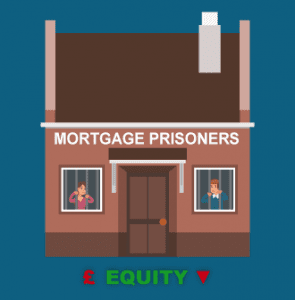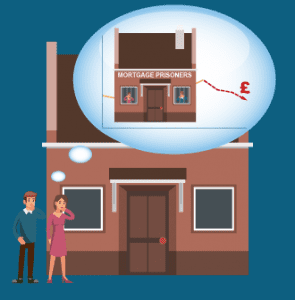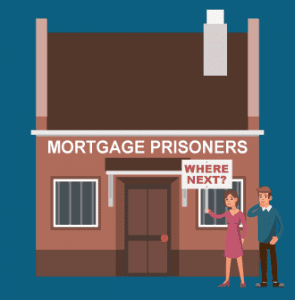What Are Mortgage Prisoners?
 Mortgage prisoners are homeowners who are trapped in expensive mortgage deals.
Mortgage prisoners are homeowners who are trapped in expensive mortgage deals.
It’s a scenario that you may find yourself in once the initial term of your mortgage comes to an end.
The small print on most mortgage contracts gives the right for the lender to charge an excessively high Standard Variable Rate (SVR) once the term ends.
Towards the end of the term, however, most borrowers swap to a more favourable rate – either through the existing lender or the many others out there.
But if the house does not have a sufficient amount of equity or your financial circumstances have worsened, it may not be so easy to do so.
This means that you may end up stuck on a high mortgage rate – even though you’ve never missed a payment.
You’re not alone…
Estimates point to over 200,000 homeowners being in this situation, a number that could well increase in the coming years.
This is a completely frustrating and unfair situation to be in, especially if you have a large mortgage remaining.
The FCA and Mortgage Prisoners
With most mortgages tracking the Bank of England base rate, many homeowners are paying very low interest rates at the moment (often under 3%).
Mortgage prisoners, however, are often paying up to double this amount (sometimes more).
As a result, UK Mortgage Prisoner Support Service (a not for profit organisation set up to help people in this predicament) have been calling for the FCA (Financial Conduct Authority) to create a more level playing field.
They also point out that many home loans were ‘packaged up’ and sold to so-called Vulture Funds in the aftermath of the financial crisis.
These lenders do not have the same kind of licences as high street lenders such as Nationwide or Halifax do. They operate without the same regulatory control.
In essence, they can do and charge what they want in line with the original contract – even if it contravenes consumer law.
Am I at Risk of Becoming a Mortgage Prisoner?
 There is a range of scenarios which could put you in the position of being a mortgage prisoner:
There is a range of scenarios which could put you in the position of being a mortgage prisoner:
The Great Financial Crisis, Brexit and COVID-19’s Impact on House Prices
The macroeconomic effects…
The credit crunch and 2007/08 recession caused large price drops in certain parts of the country. Some areas, particularly in the North and the Midlands, haven’t fully recovered yet.
It’s never easy to predict where house prices could go, but the situation could potentially get worse as risks related to Brexit and, more recently, coronavirus come to the fore.
The result could be that more homeowners could fall into negative equity and face problems when seeking out new mortgage deals.
Mortgage Market Review (2014)
In the lead up to the Global Financial Crisis, getting a mortgage was a lot easier than it is now.
Many buyers and remortgagers were able to access 100% finance for their homes (with no deposits).
Crazy as it may sound, it was even possible to get 125% mortgages! Here, the extra money was often given to buyers in the form of an unsecured loan.
With income affordability and creditworthiness assessments also relatively loose, all this meant that the number of people buying and remortgaging their homes reached historic highs.
But when the credit crunch hit, the mortgage lending landscape was forced into a dramatic change.
Much depended on the terms and conditions of the mortgage contract.
Some homeowners were fortunate enough to automatically swap to interest rates that track the Bank of England Base Rate (BBR) – now at a historically low 0.1%.
Yet others were pushed on to higher (‘standard variable’) rates, many of whom remain as mortgage prisoners today.
How the Mortgage Market Review changed things…
The government realised that such frivolous pre-crisis lending practices needed to stop.
In 2014, Parliament ordered that mortgage lenders must follow a strict set of guidelines.
Lenders must now run through every application with a fine-tooth comb – including all incomings and outgoings. They’ll even look at things like your daily spending habits.
Borrowers also need to show secure incomes. Unlike before, whilst there are some high mortgages reaching 90%, if your income is low or irregular you’ll need to put down a higher deposit.
Using a process called ‘stress testing’, they apply different scenarios to your case to make sure that you won’t default on the home loan.
Whilst the Mortgage Market Review was welcome, it did little to help people who took out mortgages in years leading up to the financial crisis.
Many who have tried to look for a better remortgage deal end up getting declined. This is even the case for those who have never missed a payment.
The result is they’re stuck on the unfavourable variable rate with no recourse.
Credit Rating Issues
You may have missed a payment which has adversely affected your credit rating.
With stricter rules governing how mortgages are granted, you may struggle to get a better deal because of this.
Sadly, something as simple as a forgotten council tax bill can cause huge problems when getting a home loan or remortgage.
See some tips below on how to improve your credit score.
Your Household Income Has Dropped
As mentioned above, mortgage lenders base the amount they grant on your salary or annual earnings (if you’re self-employed).
This is usually a multiple of what you and any co-buyers earn.
If the total amount earnt were to drop, say your spouse goes back to work part-time for example, the number of available mortgage options does the same.
What to Do if You’re a Mortgage Prisoner?
 Remember all is not lost and there is almost always a solution.
Remember all is not lost and there is almost always a solution.
Below are some of the common pieces of advice we provide to mortgage prisoners.
Speak to Your Lender and a Good Mortgage Broker
Probably an obvious idea that you’ve tried already, but it’s worth giving your mortgage lender a call every so often.
Mortgage company criteria is not static and they may be willing to listen to your situation. This is especially true given the extra pressures being piled on by the Financial Conduct Authority.
Despite the extra fees, it’s well worth approaching a good mortgage broker. He/she will be able to search the whole of the market to find you the best option.
Overpay Your Mortgage and/or Accumulate Savings
If you can afford it, it can make sense to pay some extra money towards your mortgage every month. The aim is to chip away at the debt you owe.
Strange as it may sound, make sure that the lender doesn’t charge penalties if you were to do this. They may also limit how much you can pay off every year.
An alternative idea is to put the money into a savings account (see Money Savings Expert’s recommendations here). You can then use this money and any earned interest to pay off the mortgage.
In the meantime, the value of your property may well increase (as will the level of equity).
Look for a Low Equity Remortgage
The days of 100% mortgages are pretty much over. However, there are some mortgage lenders out there pushing out 90% mortgages.
Typically, however, these are aimed at first-time buyers who can access the government’s Help to Buy Loan.
Nonetheless, there’s usually more chances of success if you can show a sufficiently high level of income as well as back up savings.
They will also observe market conditions and what is known as the ‘credit cycle’.
In a down or flat market, for instance, they may require higher deposits. This is because, in the eventuality they had to repossess, they would want to make sure they will at least get the amount they lent back.
You would lose the deposit paid into the property in this unfortunate scenario.
Look for a Negative Equity Remortgage
Lenders rarely advertise negative equity mortgages, but sometimes offer them to people in need.
For example, if you have found a new job coincidentally with applying for a new mortgage, they may be more lenient. Here, the lender will ask for proof of your future income.
Other situations could include if you or the main income earner paying the mortgage has become ill.
It really comes down to the lender’s discretion and how much sympathy they have to your situation.
Swapping to a Repayment Mortgage (if You’re on an Interest-Only Mortgage)
Many homebuyers took out interest-only mortgages in the lead up to the 2007/08 crisis.
This means that none of the total debt has been chipped down over time and people have got into negative equity as a result.
Your lender may be open to the idea of swapping your mortgage over to repayment.
Note that your monthly payments will increase, but you will be able to gradually reduce what you owe.
Access Guarantor Remortgages
There are a handful of lenders out there that may be able to provide 100% mortgages if you use a guarantor who will act as a ‘sponsor’.
The mortgage lender will undertake strict background checks.
Essentially, it would be as if the guarantor is taking on the mortgage him or herself.
Crucially, the guarantor must also put some of his/her own property up as security. Usually, this would be 25% of the value (of the property being remortgaged).
Should a default occur, they would be held liable. The lender would also have a first charge against the property meaning that the guarantor’s own property could potentially get repossessed in this scenario.
Alternatively, the guarantor can put the funds into a locked savings account which is held for the duration of the mortgage.
They may also require you to take out Mortgage Payment Protection Insurance (MPPI). This is also sometimes known as a Mortgage Indemnity Guarantee (MIG).
Money from Friends or Family
Perhaps you could borrow some funds from friends or family which can be used to decrease the overall debt load secured against the property.
Regardless of where the market is at, if you can get your mortgage to around 75% of the property’s value, your options widen.
Note that the lender will perceive this as a gifted deposit and require extra paperwork during the conveyancing process.
Sell The House
You could potentially sell up but may have to ‘plug the gap’ if you find yourself in negative equity. Note that you’ll have to pay estate agency and conveyancing fees as well.
There is also the option of selling the house quickly through a company like Property Solvers. However, the purchase price we offer will be under the market value (we do pay all the legal fees and there are no estate agency costs).
You can then perhaps look for a smaller house (where you would have more equity) or simply rent.
Add Value to the Property
Although it can be a costly exercise, improving your property can often boost it’s value even more.
Note that a cosmetic upgrade isn’t usually sufficient. A modernised kitchen and bathroom, new carpets and redecorating throughout are a bare minimum.
Also, if your property has planning potential, this is a great way to boost the value. For example, could you extend to add more living space or a further bedroom?
When converting the roof space, you may be able to get Permitted Development Rights (PDRs) where you benefit from not having to go through the hassles of planning permission.
Assisted Sale
Although we don’t market assisted sales explicitly, it’s an option that we offer through our we buy any house service here at Property Solvers.
Related to the above, if the house is in disrepair and/or has the potential to extend, we will invest funds and subsequently sell it for you for more money through our estate agency.
We do expect a return from the money invested – however, the equity gains you benefit from (without putting any of money in yourself) can demonstrably put you in a better financial position.
Improve Your Credit Rating
Although many of the following tips may depend on your financial circumstances, combined with the other tips above, they may help improve your position when re-mortgaging.
Without putting too much of a dampener on things, there are many borrowers that have near-perfect credit ratings that still are mortgage prisoners.

Check Your Credit Reports
Regularly check your credit reports through agencies such as Experian, Equifax, TransUnion and Crediva. Also, CheckMyFile collates data from all the agencies into one report. If anything flagged up, make sure you get it resolved.

Check for Errors on Your Credit Report
If you find any errors, get in touch with the lender directly. They should be proactive in helping you remove the issue from your credit file.
Make sure that things don’t get out of hand. Credit card companies specialise in encouraging people to take out unmanageable debt;

Pay Your Bills Using Direct Debit
Related to the above, setting up all your bill payments by direct debit will ensure that nothing is missed.
If you agree on an overdraft limit with your bank, any unexpected debits that go over the limit will not have negative effects on your credit score. You may be charged a penalty however.

Remain in Stable Employment
Try not to swap jobs and always try to remain in your current employment for the long term;

Joint-Account Issues
If you have a joint account with another person who has a bad credit history, this could have an influence on your ability to access mortgage finance.
Also, if a partner who you own the house with has any criminal convictions, this could affect your own credit rating.

Strategic Credit Card Management
Take out a low-interest credit card and spend a small amount every month.
Crucially, make sure the accumulated amount is then paid off every few months (bringing your balance to zero).

Reduce Your Unsecured Debt
If you have a number of credit cards or unsecured personal loans, it’s worth seeing how you can bring them down as much as possible.
For example, consider transferring all of your debts to one credit card. This should make things more manageable.

Avoid Multiple Bank Accounts
Close any bank accounts that you’re not using.

Watch Out for the Monthly Expenses Building Up
Remember that whenever you apply for something seemingly innocuous like a mobile phone or car loan, it can all have an effect on your credit rating.

Electoral Roll
Get on the electoral roll at your local council. This shows that you have some form of stability;
Mortgage Prisoners – Where Next?
 Although there’s more attention than ever before, the direction of travel with regards to mortgage prisoners remains in doubt.
Although there’s more attention than ever before, the direction of travel with regards to mortgage prisoners remains in doubt.
The bottom line is that mortgage lenders are often reluctant to take borrower off higher rates as they ultimately earn less.
Much more pressure is therefore needed to force them to behave more fairly.
Lobbying efforts by UK Mortgage Prisoner Support Service and Money Savings Expert have been at the forefront of pushing things forward. There was also a BBC documentary that bought much-needed attention to the issue.
The main demands being made are:
- To stop the sale of packaged home loans to vulture funds;
- Widen the regulatory rules meaning that mortgage prisoners are better protected from extortionate interest rates;
- Control the profit margins that lenders can make;
- Bring all UK mortgages back to traditional lenders;
- Wider adherence to Consumer Protection from Unfair Trading Regulations legislation.
Moving Foward…
It’s estimated that 80% of people in this situation have packaged mortgages owned by vulture funds.
This effectively means that any obligations imposed by the FCA are a blunt instrument.
Whilst the remaining 20% may be able to access more lenient mortgage criteria, there are increasing calls to roll out what’s known as a ‘modified affordability assessment’ across the board.
By definition, as a mortgage prisoner, you would need to fulfil set criteria including:
- Being up to date with your mortgage payments for the last 12 months. In essence, the longer the better;
- The term has ended and you’re on a standard variable rate (typically higher );
- Not borrowing more money against your property;
- There are no plans to sell the property;
- There will be a genuine benefit from switching mortgages.
At the current time, the mortgage market is going through a process of reevaluation resulting from the coronavirus pandemic.
At the height of the pandemic, the market effectively froze and a number of products were withdrawn. This meant that the FCA needed to grant lenders more time (extended from 3 to 9 months), leaving many borrowers in limbo.
Nonetheless, it’s now ever clearer that it was the government that sold off the responsibility of these mortgages.
An All-Party Parliamentary Group on Mortgage Prisoners (APPG) has therefore been formed to directly appeal to the FCA and deal with this issue headfirst.
The aim is to widen the remit of the FCA to target the vulture funds controlling these mortgages.
The APPG will also call for a reasonable limit on standard variable interest rates.
Join the Force Against Mortgage Imprisonment
Law firm Harcus Parker taking legal action on behalf of a number of people that have previously taken mortgages with Northern Rock, Bradford & Bingley or Mortgage Agency Services 1-7.
Perhaps the most well-publicised as it was one of the main triggers of the financial crash back in 2007.
This formerly nationalised lender now trades as Landmark.
The mortgages were sold to an American private equity firm called Cerberus Capital Management. These mortgages are also owned by NRAM Limited, although you may find that you’re dealing with UK Asset Resolution when you try and get in touch with the lender.
Bradford & Bingley were nationalised after the financial crisis.
Heliodor currently administers many of these mortgages. Heliodor is the trading name of Topaz Finance.
Note that if you have taken finance out with Mortgage Express, Topaz Finance are likely to be administering your mortgage at the time of writing.
Home loans held by Mortgage Agency Services 1-7 are now held by the Co-operative Bank.
You can register on the Harcus Parker website and they will be in touch to ask for more information about your specific case.
The intention is to claim compensation back from the lenders on the basis of unfairly high rates.
Note that although, this is operating on a ‘no sale, no fee’ basis, the firm will be taking a 35% share of any win they achieve (plus VAT). There will also be disbursements to pay.
To Conclude…
As stated above, there are many homeowners across the country going through this situation. The number is likely to rise especially as more mortgages taken prior to the credit crunch come to an end.
Please feel free to email us at info@propertysolvers.co.uk. We’d be more than happy to help in any way we can.
Remember also we have various sell house fast solutions should you decide this is the best course of action.


